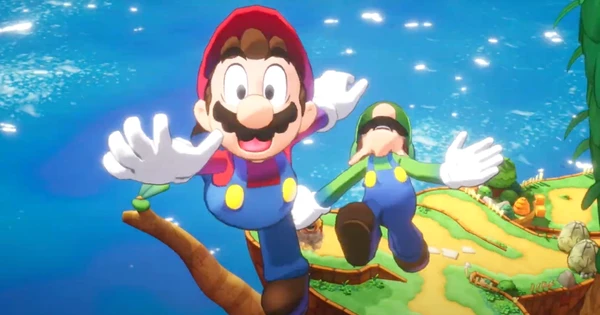Curated From www.animenewsnetwork.com Check Them Out For More Content.
Welcome back, folks! As it turns out, that bit of sickness I felt last week was COVID. Thankfully, I’ve kept up to date on all my vaccinations; this wasn’t anywhere near as bad as it could have been, and none of the people around me (that I know of) have gotten sick. I wanted to play more video games (maybe even catch up on Final Fantasy XIV, get some of those Yōkai Watch mounts), but being sick does a number on your desire to do much of anything. Still—I finally got to play some Xenoblade Chronicles 3! I’ve even hit triple digits in my playtime. Man, sixty hours between Chapter 4 and Chapter 6 is a whole game, courtesy of me taking the scenic route. Who knows, I might even beat the game this summer. Wouldn’t that be nice?
This is…
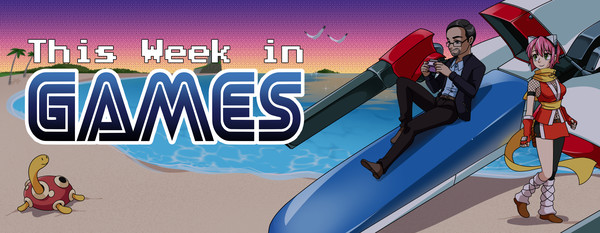
Who’s Making Mario & Luigi: Brothership?
So, here’s a true story from last week’s column: while discussing Mario & Luigi: Brotherhood, the newest entry in the Mario & Luigi series of RPGs, I was trying to source a statement I had read somewhere that it was being worked on by some ex-AlphaDream devs. See, AlphaDream was the studio that had originally made the Mario & Luigi games, but they sadly went out of business sometime after releasing their last title, Mario & Luigi: Bowser’s Inside Story + Bowser Jr.’s Journey on the Nintendo 3DS. Problem: I couldn’t source it. I know I’d read it somewhere, but I couldn’t find anything sourcing the info. (I eventually found it.) More to the point, we don’t know who’s working on the game—at all! Nintendo hasn’t announced it, the websites haven’t revealed anything, the Direct didn’t say anything. No answer; just wait for the credits roll to get your answers. The scuttlebutt going ’round is that ILCA, the studio responsible for the Pokémon: Brilliant Pearl/Shining Diamond remakes, are the ones working on Brothership—which is a source for some consternation for fans, as Brilliant Pearl/Shining Diamond didn’t have the best reception. But again, there hasn’t been much to substantiate that.
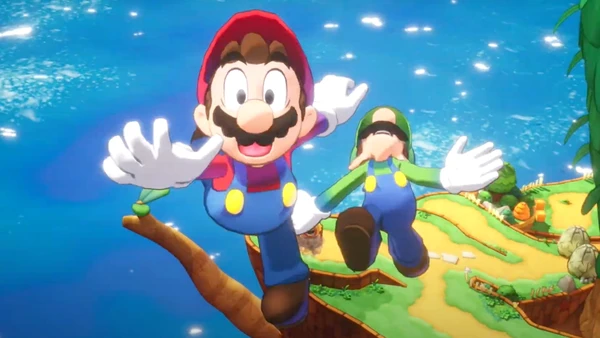
© Nintendo
This has brought up many discussions concerning Nintendo‘s cloaked procedures and archival. So, let’s talk about that.
On its face, this is all a bad way of handling things because it contributes to the diminishment of the individual studios working with Nintendo on these games in favor of propping up the image that these games come from the nebulous conglomerate that is “Nintendo” at large. What we see as a massive company is in fact made up of much smaller teams, including Nintendo Planning and Entertainment Development (which itself was formed from Nintendo Research and Development 1), or any number of their first-party studios like 1-Up Studio (Mother 3), Next Level Games (Luigi’s Mansion, Super Mario Strikers), or Monolith Soft (Xenoblade Chronicles, along with a lot of support work for other first-party Nintendo games).
Keeping track of this stuff isn’t easy; even Nintendo‘s own resources aren’t very trustworthy. I mentioned Jeremy Parish and his NES Works series, which catalogs the entire library of video games published on the Nintendo Entertainment System throughout its lifespan. On a number of occasions, he’s had to make some rough estimate on when a specific game was published because even Nintendo‘s websites contradict other resources. A few people have likened this to how Disney operates, underplaying the contributions of individual artists working on their projects to sell the idea of “Disney Magic™.” It’s true that Nintendo values its brand, and will defend it at the slightest provocation. Games already struggle with archiving their history something awful; we can’t even take for granted that a game will be playable within the next five years (hence why a lot of Marvel Vs. Capcom fans are jumping on the chance to get a physical copy of the upcoming compilation—they won’t get fooled again).
On the other hand, some people on the internet absolutely cannot be normal.
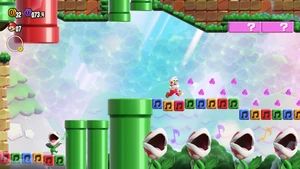
© Nintendo
We didn’t know Kevin Afghani was going to inherit Charles Martinet‘s role as the Mario Bros. until after Super Mario Wonder came out. And sure, it would have been great to see some interviews with the guy ahead of the game’s release, hyping up his presence and talking about how great an honor it is to voice such important characters from gaming’s pantheon. But also: holy crap, can you imagine how much harassment he would’ve gotten for it? We live in a world where it isn’t a question of whether Kevin Afghani would’ve seen harassment for being the new voice of Mario Mario and Luigi Mario, it’s a question of how much he would’ve gotten—and the only humane answer to that should be “none,” but some people on the internet absolutely cannot be normal.
MercurySteam garnered a pretty poor reputation for their work on the Castlevania: Lords of Shadow games. They wouldn’t exactly have been anyone’s first choice for, say, making a new Metroid game—but Nintendo went with them, against all hope. Twice, even. And in stark contrast to the negative reception that the Lords of Shadow games got, Metroid: The Return of Samus Aran and Metroid Dread are held up as some of the biggest and best Metroid games in recent history. Heck, Dread was even considered by some as worth the 20-year wait. But MercurySteam refused having approached Nintendo with any pitches for Metroid right up until the E3 2017 reveal for Return of Samus Aran. Now, this shouldn’t have been an issue—studios making good games can sometimes make a bad game, and studios that make bad games can sometimes make good ones. But some people on the internet absolutely cannot be normal.
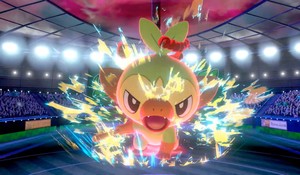
© Nintendo, Game Freak
Nintendo‘s fans on the internet went absolutely ballistic when Pokémon Sword/Shield revealed that a great number of Pokémon would not be compatible or even listed in the in-game Pokédex, with fans taking to the internet and calling it “Dexit,” demanding that each and every last of the 1000+ Pokémon be introduced into the Galarian Pokédex. Aya Kyogoku, director of the Animal Crossing games (and first female director at Nintendo Entertainment Analysis & Development) shut down her Twitter page after hordes of Animal Crossing fans flooded her DMs with comments and critiques about Animal Crossing: New Horizons.
In this day and age, game development has not only become more fraught due to the economic instability of it all—it’s no longer enough to make a good game that reviews well and is well-received; it needs to sell millions of copies, after all. Game development is also fraught because we live in an era with too many tools for people acting in bad faith to become the loudest people in the room and make your life a living hell. People you’ve never met will take your game and make it a banner in their cultural war, then turn on you the moment they learn that there’s one centimeter of fabric too much over some woman’s cleavage. If a remake is not at some level of superiority over the original, the pitchforks come out. Some people have made careers trying to find the next Watergate scandal off of who is doing consulting for a title. We’ve had open communication and seen what folks have done with it—and it ain’t worth it anymore, man! Some people on the internet absolutely cannot be normal. Kevin Afghani was likely saved a ton of grief by folks getting to hear him as Mario and Luigi during Super Mario Wonder before finding his name in the credits. Any question about whether MercurySteam could do right by Samus probably flew out the window when folks saw her new counter-attacks in action in the trailer. This is not to say that Nintendo hasn’t laid its fair share of eggs, but it has hit upon a good idea of just letting the work speak for itself. We’ll know who developed the game because their name will be in the credits—and once the credits roll, they’ll have been saved gigs and gigs of hate mail for their trouble.
I really, really wish this wasn’t how online communities worked. I’ve been around for a long time, and fans with negative personalities have always existed (the folks working on Animaniacs, The Simpsons, and Powerpuff Girls knew the type all too well). The gaming world has always been rife with tribalism, no thanks to dumb ideas like the Console Wars or people using review scores for moral superiority points. For nigh on a decade now, that’s all changed. The mediums of communication do not reward you for liking games or even being good at them. They reward you for constantly sharpening your axe for some reason or other. They reward you for finding a new Public Enemy #1 and constantly trying to ruin their life, regardless of the reason. They reward you for being a foot soldier in a made-up war that only exists in the minds of people with no conscience and no greater goal than to increase their number of subscriptions, who would flip on a dime on any given work to have some kind of narrative to peddle continuously. And there are actual casualties to this: people whose actual jobs and actual lives are put in danger because armchair experts who claim to have all the answers spun a roulette and the arrow fell on a mealy-mouthed, “I’m not saying you should send these guys hate, but here is the name of this person who is responsible for all this stuff and here is where you can find all of their socials…” And honestly, if Nintendo decides to just side-step all of that by keeping information on a need-to-know basis? That’s 100% fair. Because some people on the internet absolutely cannot be normal, and they won’t use that information for anything good.
We can worry about archiving the history of game development once we can ensure that game development in the here-and-now doesn’t leave people exposed to bad-faith actors. People who want to act in bad faith can and will take a mile from an inch. As far as I see it, Nintendo might be doing their due diligence in keeping their devs and associated studios safe. Maybe there can be more transparency once people start being normal on the internet.
The Sega Neptune Lives Again… in Brazil
This one’s going to need a bit of history. Back in the 1990s, Sega was neck-and-neck with Nintendo in the race for the 16-bit consoles, courtesy of the Sega Genesis/Mega Drive. The Genesis itself also had a number of add-ons that helped extend its lifespan: the Sega CD, which could feature full-motion video and audio quality surpassing cartridge-based games; and the 32X, a 32-bit add-on (at one point, referred to as “Project Mars”—keep this in mind for later!). The Sega CD had a good few classics to its name, like the Lunar: The Silver Star, Snatcher, and Sonic CD (and its memorable intro). The 32X, sadly, didn’t see nearly as much success; it was largely seen as life-support for the aging Genesis, while the Sega Saturn was in development and only saw support for a few months. Not a lot of games released on it, and the classics like Blizzard’s Blackthorne or Doom reside among other games like Corpse Killer or Knuckles Chaotix.
Of course, all of this was amidst the constant bickering between Sega‘s Japanese and American branches—and the American branch wanted to wring out as much as they could from the success of the Sega Genesis. And since there’s money to be made off of the entirety of the Sega Genesis and Sega CD library (and maybe Knuckles Chaotix), there were plans for the Sega Neptune. Get it? Like how the 32X was once nicknamed “Mars” and the next Sega console was the Sega Saturn? Anyway, the goal was for the Sega Neptune to be an all-in-one console capable of playing all Sega titles across the Sega Genesis, Sega CD and Sega 32X. But Neptune’s development was scuttled, with Sega wanting to hurry up and move onto the Sega Saturn to compete with Sony‘s upcoming PlayStation. So the Sega Neptune became one of the most famous canceled consoles in the industry, becoming an in-joke so famous that it inspired the character Neptune/Purple Heart, star of the Hyperdimension Neptunia series.
The dream of the Neptune lives again, however! Developed by the Brazilian firm GamesCare, the GF1 Neptune uses the original framework of the Sega Neptune in addition to a bunch of modern features. It’s expected to play Mega Drive and 32X consoles, along with the possibility of connecting to a CD-based add-on—as well as other features like SD card compatibility, wireless Internet connection, and an online storefront for purchasing new titles. There’s an advertised formal reveal this June 30th that’s intended to go further in-depth with the console’s features and upcoming line-up, including a new game designed for the GF1 Neptune.
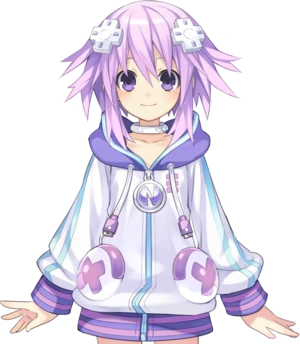
© Compile Heart, Idea Factory
Leave it to Brazil to bring the Neptune alive. Brazil has a very close relationship with Sega‘s games, specifically the Sega Master System. Long story short: importation tariffs and taxes mean that any other console is prohibitively expensive to all but the richest of people in Brazil—for example, a Nintendo Switch in Brazil retails for the USD equivalent of $567 (2,999 real). And with the painful three-part combination of Brazil’s weak currency, the poverty rates in Brazil, and the exorbitant price of consoles, it’s no wonder that most players in Brazil resort to piracy or local “famiclone” consoles. Enter Tectoy; their licensing deal with Sega meant that they could release clones of the Sega Master System, which were popular enough to last them a very long time, even making their own versions like the Master System Compact and the Master System 3. Thanks to Tectoy, 8 million Master Systems have been sold in Brazil alone—and they’re still being sold to this day, long after the Master System had been discontinued in other markets. Tectoy also broke into the Mega Drive market, and while it’s not nearly as successful as their Master Systems, it’s still big enough to give anyone with a Mega Drive console something to plug into a GF1 Neptune if they should get one.
Since this is in Brazil, it’s very, very unlikely we’ll ever see the GF1 Neptune released in the US. I imagine plenty of foreign console enthusiasts will be delighted to pick one up, but you’ll likely have to jump through several hoops to import one. I imagine StopSkeletonsFromFighting (who has a fantastic breakdown of Tectoy’s history in Brazil—as well as their home-grown console, the Zeebo) is itching at the chance to get one. Sega-fanatic that I am, I don’t know, I think I might sit it out. Still, it’s weird to see history pop back up like this.
Sting’s Riviera: The Promised Land Is Coming Back To America!
An ongoing story we’ve been covering here at This Week in Games is the Steam port of Riviera: The Promised Land from Sting. Best known for the creepy rogue-like Baroque and the other Dept. Heaven games, Sting had recently put their efforts behind a Steam and Switch port of their classic strategy game, Yggdra Union. And while a US localization for those versions couldn’t quite be guaranteed, they happened. So we all waited for news that the Riviera: The Promised Land port would come through…
… and it finally is, with a release date of July 16!
The original Riviera: The Promised Land was released way back in 2002 on the Wonderswan Color. A curious combination of text adventure game with RPG elements, the game told the story of the Grim Angel Ein as he helped a group of Sprites protect the land of Riviera from demonic incursion—and the machinations of the evil Magus, Hector. Along the way, Ein can score points with each of the archetypal girls in his party, resulting in one of the various endings featuring the girl of your choice—plus a really hard-to-get bonus ending that is considered the canon ending to the game that I’ve never been able to get, but I digress.
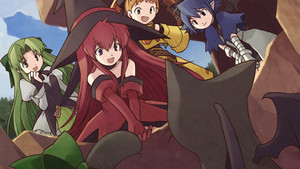
© Sting
Riviera wasn’t much until its GameBoy Advance port in 2004, with a US localization released in 2005. While it was originally a fairly stand-alone title with some far-reaching plot hanging in the background, Riviera was later folded into what Sting referred to as the Dept. Heaven series (that’s “Department Heaven”), a sweeping multi-game epic telling the tale of a war between the angels and gods of Asgard and the demons of Utgard. The real stars of Dept. Heaven were Marietta, a hapless archangel constantly tricked into misfortune, and Hector, whose plans for power spoiled everything for everyone. Riviera was retroactively made the start of the Dept. Heaven series, with the connections to Yggdra Union: We’ll Never Fight Alone not apparent until quite late into the game when the angel Marietta appears. The Dept. Heaven games continued with the many spin-offs and sequels to Yggdra Union, as well as Knights in the Nightmare and Gugnir. Unfortunately, there is a multi-game gap between Yggdra Union and Knights in the Nightmare; all we know is that one of the titles was intended to be an MMORPG that was canceled later in development. Following Gugnir, the Dept. Heaven series sadly faded away, with Sting exploring other projects, until they seemingly started the gears back up by porting Yggdra Union and Knights in the Nightmare to PC and Switch (though the Knights in the Nightmare port never came stateside—come on, Sting…!).
So, what enhancements does the Steam port offer Riviera: The Promised Land? Tons. Players can now choose between Japanese or English audio tracks, HD versions of all CGs, and an auto-save function. You’ll now have five different sources for the soundtrack (I imagine this includes all versions of the OST, from the Wonderswan port to the GBA and PSP ports and so on). You’ll be able to speed up the game by up to 5x, with an option for skipping certain in-game events. There are new difficulty modes and a new UI for greater ease of play. There’s also a new Boost system for gaining EXP; see, in Riviera, characters earn stat bonuses by “mastering” new weapons, requiring you to go into Practice Mode and train against mobs of monsters until you’ve used each item enough times to “master” them. A novel system but also a time-consuming one—especially since some items require you to use them up to fifteen times to “master” them. Mastering weapons is also how you gain your limit break attacks with each weapon, which is vital to damaging stronger enemies while beating battles with a good rank. So, anything to cut down on the grind is appreciated.
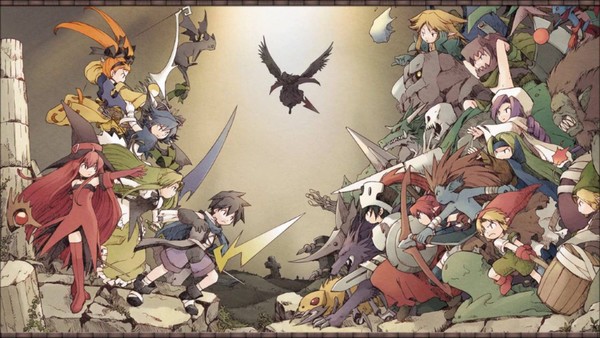
© Sting
So far, the Steam port of Riviera looks great; I think my only complaint is that the in-game sprites are based on the PSP port, so they have that weirdly blobby, blurry look that many new HD games of the era had when adapting pixelated sprites into HD. I’d have hoped that a remastered version of the game would include some better sprites, but oh well. No word yet on whether or not we’ll get Riviera on the Switch at this rate; I’d like to hope so (especially since we got Yggdra Union on the Switch), but you can’t take anything for granted. For now, I’m just happy to see Riviera brought back. Sometimes, all it takes is seeing a weirdo RPG/VN getting brought to Steam.
Nitroplus Under New Ownership, Old Projects Back In Business
Nitroplus is a major name in the visual novel business. While they’re best known for their headphone-wearing mascot, Super Sonico, Nitroplus has also published a ton of beloved visual novels like Deus Machina Demonbane, Song of Saya and Full Metal Demon Muramasa. The news of their purchase might be worrisome—seldom do we ever cover a story about an acquisition being a good thing—but earlier this week, Nitroplus announced its acquisition by CyberAgent. CyberAgent, in the meantime, is best known as Cygames‘ parent company. This studio gave the world such massive mobile hits as Granblue Fantasy, Umamusume: Pretty Derby and Dragalia Lost.

© Nitroplus
In a twist on the usual acquisition story, Nitroplus approached CyberAgent with the desire to get bought out. Nitroplus CEO Takaki Kosaka claims that this acquisition will not significantly change the corporate structure or philosophy at Nitroplus. He hopes that this helps Nitroplus maintain and improve its management and gives them the funds to pursue previously canceled projects. I did some minor digging and couldn’t find much news on canceled Nitroplus projects, but if a CEO is willing to go on the line the way he has and declare how their other projects have been on shaky ground, this probably is for the best. And CyberAgent is sitting on a massive war chest, courtesy of all that Granblue Fantasy money.
For now, this isn’t good or bad news—just news. Let’s give this time to see how it shakes out.
Let’s wrap up with some quick tidbits
That’ll do it for this week. Hopefully, VN fans are excited about the release of the Lunar Legend Tsukihime remake that came out earlier this week! If you have a moment, check out Kennedy’s review from earlier this week! The Luigi’s Mansion 2 port also came out earlier this week. It’s a great weekend for games, hopefully folks are enjoying the crop this summer! Be good to each other; I’ll see you in seven.
This Week In Games! is written from idyllic Portland by Jean-Karlo Lemus. When not collaborating with Anime News Network, Jean-Karlo can be found playing JRPGs, eating popcorn, watching v-tubers, and tokusatsu. You can keep up with him at @mouse_inhouse or @ventcard.bsky.social.

